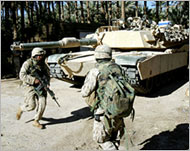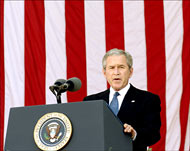Bush’s popularity takes a beating
The day after his re-election victory, an energised and confident President Bush held a White House news conference to boast about the “political capital” he had earned from the campaign.

His tone underscored the administration’s desire to pursue a politically ambitious second-term agenda, an elusive achievement for many past American presidents.
Just over five months into that second term, however, Bush job approval numbers continue to lag below the 50% barrier, a product of public dissatisfaction with the economy and mounting frustration over the violence in Iraq.
Less than half of the American public believes Bush is doing a good job in office, according to several recent polls taken by major news organizations, including a Pew Research survey that put his favourability rating at 43%.
Bush recently held a rare news conference during which he faced questions about a lame-duck presidency and dismissed any suggestion that he was losing political momentum.
“I don’t worry about anything here in Washington, DC,” Bush said.
Iraq policy criticised
While the economy remains the number one point of public malcontent, a wide range of polling data suggests that many voters want the president to spend more time addressing various foreign policy concerns, such as Iraq, and less time promoting his proposal for Social Security reform.
“I think right now the president is trying to focus on his Social Security plan and the general public just isn’t buying it,” said Nathan Gonzales, political editor for The Rothenberg Political Report, a non-partisan Washington newsletter.
 |
|
American voters are frustrated |
“Meanwhile, there are other problems overseas that Americans care more about,” he told Aljazeera.net.
Americans are increasingly worried about the situation in Iraq following one of the deadliest months for American military forces so far this year.
At least 80 US troops were killed in May, the highest casualty toll since January, according to figures released by the Pentagon. In addition, statistics released by the Iraqi government show that at least 800 Iraqis were killed in May, compared to 485 in April.
More than 1698 US troops have died since the war began and the inability of US forces to quash the violence is “naturally going to increase negative perceptions,” said Frank Newport, editor-in-chief of the Gallup Poll.
Disapproving numbers
Roughly 55% of the public disapproves of the way Bush is handling Iraq, while 57% now believe the war was not worth fighting, according to the most recent CNN/USA Today/Gallop poll.
In addition, 52% of Americans now believe military campaign in Iraq has not made the United States safer, according to a new Washington Post/ABC News poll.
“There’s no question that people aren’t excited about Iraq and they want to see some sort of resolution soon,” Gonzales said.
Despite what one political analyst described as a “subtle shift” in public opinion over the legitimacy of the war, most experts agree that US troop levels are unlikely to decrease significantly in the near future.
While a recent NBC News/Wall Street Journal poll showed that 53% of Americans would like to see a reduction in the US military presence, a majority of the country, including many Democrats, still believes the Bush administration must stay the course until some level of democratic stability is achieved in Iraq.
“Most of the Democratic Party would say, ‘It wasn’t all that smart to go into Iraq, but we still need to stay there and win this war,'” said Peter Singer, a senior fellow at the Brookings Institution, a Washington think tank.
Shared concerns
Josh Earnest, a spokesman for the Democratic National Committee, said there were some bipartisan feelings beginning to emerge over the administration’s handling of Iraq.
 |
|
Concern over the Iraq strategy is |
“Democrats and Republicans alike remain united behind our men and women in uniform,” Earnest told Aljazeera.net. “Yet Democrats and Republicans alike share some pretty strong concerns about the situation there.”
The Republican National Committee did not return phone calls for this story.
A majority of American voters remain deeply split along partisan lines, with Republicans more willing to give Bush the benefit of the doubt on Iraq and other seminal issues.
Jonathan Pryor, a lifelong Republican from Bethesda, Maryland, said he supported the war in Iraq and continues to back the president despite whatever setbacks may have occurred.
“I think President Bush has done everything he can to protect America from terrorists,” Pryor said. “He has shown the ability to be a strong leader in times of crisis and I still believe the United States is better off with Saddam Hussein in prison.”
No exit strategy
Many Democrats, however, say Bush has failed to outline a definitive exit strategy, something they would like to see in the near future.
“This president lied to us about why we went into Iraq and now he can’t tell us how long we are going to be there and how many more American lives will be lost,” said Chris Hammond, a Democrat from Washington.
As far as the political impact of Bush’s approval ratings, Newport said it was still too early to predict whether the president’s current numbers could hinder Republicans in the 2006 midterm elections.
“Public opinion of the president’s job performance is historically very changeable,” he said.
Nevertheless, Earnest said recent polls could be a harbinger of things to come in next year’s congressional showdown.
“You’re going to find that Republican members of Congress who are running for re-election in 2006 are going to be saddled with an unpopular president,” he said.